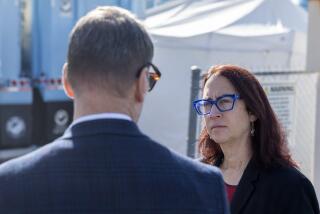Dr. Nathan B. Friedman; Pioneering Pathologist, Medical School Professor
- Share via
Not even a degenerative spinal disorder that left him in a wheelchair could make him stay home. Nor could turning 90 this Jan. 30.
Dr. Nathan B. Friedman, the pathologist who did seminal studies on testicular and breast cancer and found a way to treat World War II soldiers for the disfiguring infection of trench foot, just kept right on reporting to Cedars-Sinai Medical Center in Los Angeles.
He was still working to alleviate suffering until three days before his death Sunday of cardiac arrest at the hospital he made his own, said Robert Speers, the stepson who provided the doctor’s ride to work.
Friedman had served as chief pathologist at Cedars of Lebanon Hospital, one of the two forerunners of Cedars-Sinai, from 1948 until 1969, when the new medical center was created. He then joined the new hospital’s staff.
Dr. Stephen A. Geller, chairman of the Cedars-Sinai department of pathology and laboratory medicine, credited Friedman with creating the hospital’s pathology research division 53 years ago and called him “one of the legendary figures in American medicine and American pathology.”
“In his long practice of medicine Nathan Friedman was first a biologist and then a physician and pathologist,” Geller said, “and his remarkable insights into disease processes provided repeated evidence of his unique skills.”
Among Friedman’s major contributions, Geller said, were his studies and papers on pathophysiology of pancreatic islets, radiation enteritis, bladder tumors and testicular tumors, and the pathology of the breast and the endocrine glands.
Friedman made his breakthrough in trench foot research by studying amputated feet and legs from World War II soldiers while assigned to the Armed Forces Institute of Pathology from 1942 to 1947.
Known for a generous heart beneath his gruff, curmudgeonly exterior, Friedman was greatly loved by his students and colleagues. At the celebration of his 50th anniversary with Cedars, one former student commented: “He showed me that a pathologist really is a physician, a guardian of the highest standards of morality and honesty, and a biologist who considers his specimens in the context of all we know about science and life.”
Friedman, who likened a hospital to a cathedral, had also been a clinical professor at the USC School of Medicine since 1950. There he concentrated largely on teaching future doctors, dentists and other medical professionals how to deal with their patients’ human behavior, including fear of pain, side effects of treatment and death.
Born in New York City, Friedman was the brilliant son of a neurologist and began studying science at Harvard University when he was only 12. He went on to earn his medical degree at Cornell University, intern at Montefiore Hospital in New York City and complete his residency in pathology at the University of Chicago.
In 1939 he was a Littauer Fellow in pathology at Harvard, and he taught at Stanford University before entering the Army during World War II.
Cedars-Sinai honored Friedman in recent years by establishing an annual lecture and research fund in his name for the pathology department.
Twice widowed, Friedman is survived by two daughters, MaryLou Force and Emily Friedman, and four stepchildren, Jan Hall, Sharon Coontz and Charles and Robert Speers.
The hospital is planning a private memorial service.






